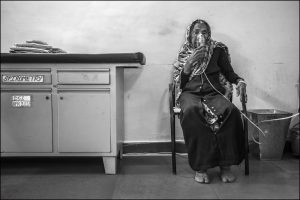
As the coronavirus pandemic continues to affect nations and individuals around the world, this is an update on the measures being taken at the Sambhavna and Chingari clinics to prevent the spread of the disease.
As of today, the total number of confirmed cases in India stands at 152, with three confirmed deaths, although news reports suggest that low testing rates across the country may mean the actual figures are considerably higher. There have so far been no confirmed cases in the state of Madhya Pradesh, of which Bhopal is the capital, but there is only one testing centre in the city, which has a population of 1.8 million people. Currently all the schools in the city are closed by order of the state government.
The Sambhavna Clinic currently remains open and patients are still receiving treatment, but measures have been taken to reduce the chances of the virus spreading. Steps are currently being taken to reduce the density of patients and ensure that visitors can remain at a safe distance from one another, while all staff at the centre have been provided with masks which they are required to wear at all times while on duty.
Meanwhile, in line with current government guidance and school closures, the Chingari Clinic has been closed for all except emergency cases, which is currently limited to only one or two children. All transport from the centre has also been temporarily discontinued. These measures have been put in place after consultation with the parents and families of the children receiving regular treatment, and we have their full support in taking these steps to protect the children, many of whom have health conditions that may put them at increased risk from Covid-19.
Unfortunately, due to the long-term effects of gas exposure, the survivors of the Bhopal disaster are perhaps the most vulnerable group in the city. Many of the survivors suffer from acute respiratory disorders after sustaining lung damage from the gas. Other common health conditions among survivors include hypertension and muscle weakness, diabetes, and various strains of cancer, all of which put survivors at increased risk from Covid-19. Many are also in the age group that are most at risk from the virus. Given that the original disaster occurred 35 years ago, anyone aged over 25 at the time is now above the age of 60. The poor living conditions of many survivors in the shantytowns surrounding the abandoned factory site also increase their vulnerability to the illness. Population density and open dwellings make self-isolation a near impossibility, while many lack access to proper medical care of the kind required to treat the virus.
In light of the vulnerability of the survivors, we will continue to take every precaution at the clinics to ensure that the health of patients is being safeguarded. We will update the blog with more information as the situation develops and wish to extend our support to all the staff, patients, and survivors in Bhopal, as well as to all those affected around the world at this difficult time.


